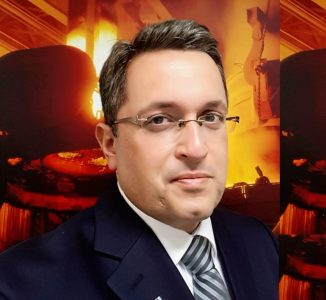We remain strongly oriented in the metal recycling sector, whereas our business interest extends to include other special waste streams, like WEEE (Waste of Electronic and Electric Equipment) and ELVs (End of Life Vehicles)

We spoke with Mr. Iosif Vangelatos, General Manager of Inos Balkan about development of principles of circular economy, contribution of business sector to it and about contribution of Inos Balkan to recycling industry in Serbia.
It seems that circular economic principles are dictating future business models. How business sector can contribute to the development of the local recycling industry?
Indeed the circular economy principles are a key element for our efforts to tackle the complex challenges of climate change, pollution and the conservation of the biodiversity of the planet. Circular economy business model is replacing the traditional linear business model, by emphasizing on the principles of reuse, repair, and recycling. Products must have an extended life cycle and their design should facilitate reuse and recycling. Valuable resources, as well as energy, can be recovered at the end of the life cycle of a product. The local recycling business should play and is playing a vital role. Legal framework and financial tools are established and green entrepreneurship is leading the way.
Inos Balkan, established back in 1951 has a long-lasting tradition in recycling of secondary raw materials, serving the local and the international industry.
Inos Balkan is among the five biggest companies engaged in the local recycling industry. Could you tell us more about company`s portfolio of recycling activities?
Inos Balkan, established back in 1951 has a long-lasting tradition in recycling of secondary raw materials, serving the local and the international industry. Today and as a member of one of the biggest industrial groups in southeast Europe, we are in a position to increase our footprint in Serbia and in Western Balkans region. We remain strongly oriented in the metal recycling sector, whereas our business interest extends to include other special waste streams, like WEEE (Waste of Electronic and Electric Equipment) and ELVs (End of Life Vehicles).
Our response to the Covid-19 pandemic was in two directions. We tried to protect all our human resources as well as to secure business continuity.
How would you rate the situation in Serbia when we are speaking about alignment with the EU’s principal directives on waste management and implementation?
The European Council granted Serbia the status of candidate country in 2012. This was a certain milestone on the country’s path to a better future, with political, social and economic stability. I do not like the term “negotiation chapter“, which is widely used when referring to the thirty-five different steps that the country should make in order to achieve integration into the EU family. I prefer to describe it as preparation. Private and public sector, citizens of Serbia, the country in total, must be ready to live, compete and excel within a different political, economic and social environment. Though recognized as a priority by the Serbian government, there is only a slight progress in terms of chapter 27. Under new leadership the ministry of Environmental Protection is gaining momentum when it comes to strategy formation and strategy deployment, and is rapidly making up for the delays of previous years. The very issue of implementing regulations and implementation control, as well as the simplification of the licensing processes remains a major challenge.
How is your organization dealing with the Covid-19 pandemic? What are your predictions for the next period?
Our response to the Covid-19 pandemic was in two directions. We tried to protect all our human resources, as well as to secure business continuity. We managed since the very beginning of the pandemic and for all our office employees to work from home and at the same time we adopted all protective measures that the WHO and the Serbian government had proposed. Finally, yet importantly, we provided our employees with a financial incentive in order to increase the percentage of employees who are getting the vaccine. On the other hand, we worked closely with all our partners (suppliers, customers and service providers) and we have achieved not only to secure the flow of raw materials towards our customers but also to increase it. Covid-19 pandemic is a certain challenge for people and companies. But it seems, as the economies around the globe are revibing, that we have a chance to come out stronger.